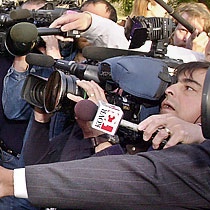The arguments swirling around the RDA may seem like a side issue in Australian politics, but they’re not – they’re of fundamental importance. They go to the heart of democracy.
The problem is the Act is unfair.
There are two foundation principles at stake here without which democracy fails: the right to express our opinions, and the protection of minorities who can’t defend themselves, in this case racial minorities.
Section 18C of the RDA is designed to stop racists making offensive comments under the guise of their right to freedom of speech.
“It is unlawful for a person to … offend, insult, humiliate or intimidate another person or a group of people”
But as my colleague, Robert Todd, one of the top Australian media lawyers points out, in the article below (published in The Australian last week), the Act doesn’t strike the right balance in relation to free speech. Free speech is relegated to an afterthought in 18D.
In an ideal democracy, explains Todd, there is a necessary tension between the two – a tug-of-war. Where there is a dispute, Free Speech is pitted against Racial Slur, and the argument is resolved through mediation or in court.
Unfortunately, we’ve seen that tension between the two manifest in the destructive and divisive public debate. People have become labelled as being in one of two extreme opposing camps: the free speechers or the sensitive racial minorities.
In fact I, like most journalists/lawyers/PR folks in my network, am in the middle. I see the importance of both. And I see a bad Act; to me, the divisiveness we are witnessing is evidence of that.
The best way to right the wrong in the Act, is to flip the test from the slighted person alleging, “I feel insulted or humiliated or intimidated” to accusing the perpetrator of an act, “You are abusing your right to free speech with the intention of inciting others to hate people because of their race”. The former is difficult to prove or disprove in court; how do you successfully argue for or against a person’s feelings? The latter directly pits Free Speech against Racial Slur.
The former tends to create more division (which is exactly what has happened with the public debate surrounding the Bill Leak cartoon and the QUT students case); the latter acknowledges both foundations of democracy and reaches for a middle ground through mediation or a subjective and (hopefully) pacifying judgment in court.
______________________________________________________
The Australian – 9 March 2017
ROBERT TODD
While attempts at compromise over Section 18C are to be welcomed, if repeal is unattainable, the addition of a “reasonable Australian” may not solve the fundamental problem.
That problem is that 18C does not strike the right balance in relation to free speech.
Section 18C is a civil wrong. Historically civil wrongs (such as torts) were organised based on the protection of rights or the concept of fault. For example, before defamation became a strict liability tort a fault requirement balanced the right to reputation and free speech.
In contrast 18C imposes an objective test that invokes the perspective of those in a particular group which is the target of the conduct.
Relief is only obtained from that test by defendants if they prove the elements of 18D. The right to free speech is not balanced – it is relegated to a matter of possible mitigation from liability.
While the ordinary language of reasonableness is seductive to a layman, in the hands of a lawyer “reasonable” almost inevitably rises to a level that cannot be ordinarily met by any ordinary person.
The problems associated with the defence of statutory qualified privilege in defamation have amply demonstrated this over the years.
In addition the consequences of an adverse finding under 18C invariably include stigma and public denunciation which are usually associated with the criminal law.
While there is no penal consequence these factors must be seen as extremely inimical to free speech with a chilling tendency. Criminal Law has tended to abhor objective tests for serious matters given the consequences of their imposition.
The focus of the debate to date has been around abolition or switching to an objective test that invokes the legal fiction of a reasonable Australian.
However, if repeal is unattainable, then to achieve the sort of compromise the International Development Minister Concetta Fierravanti-Wells seeks, consideration should be given to scrapping an approach based on an objective test of any kind.
Instead, a better compromise would involve adopting a fault-based regime with the onus of proof resting on the claimant; in other words: a subjective test focussed on the person engaged in the conduct.
In that way at least a balance of the competing interests can be restored and only the most serious and obvious cases are likely to be prosecuted.
Robert Todd is a media law partner with Ashurst





